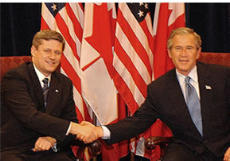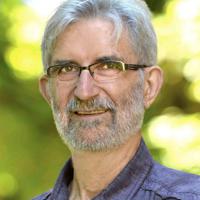
What do close advisors to Stephen Harper and George W. Bush have in common? They reflect the disturbing teachings of Leo Strauss, the German-Jewish émigré who spawned the neoconservative movement.
Strauss, who died in 1973, believed in the inherent inequality of humanity. Most people, he famously taught, are too stupid to make informed decisions about their political affairs. Elite philosophers must decide on affairs of state for us.
In Washington, Straussians exert powerful influence from within the inner circle of the White House. In Canada, they roost, for now, in the so-called Calgary School, guiding Harper in framing his election strategies. What preoccupies Straussians in both places is the question of "regime change."
Strauss defined a regime as a set of governing ideas, institutions and traditions. The neoconservatives in the Bush administration, who secretly conspired to make the invasion of Iraq a certainty, had a precise plan for regime change. They weren't out to merely replace Saddam with an American puppet. They planned to make the system more like the U.S., with an electoral process that can be manipulated by the elites, corporate control over the levers of power and socially conservative values.
Usually regime change is imposed on a country from outside through violent means, such as invasion. On occasion, it occurs within a country through civil war. After the American Civil War, a new regime was imposed on the Deep South by the North, although the old regime was never entirely replaced.
Is regime change possible through the electoral process? It's happening in the U.S., where the neocons are succeeding in transforming the American state from a liberal democracy into a corporatist, theocratic regime. As Canada readies for a federal election, the question must be asked: Are we next?
The 'noble lie'
Strauss believed that allowing citizens to govern themselves will lead, inevitably, to terror and tyranny, as the Weimar Republic succumbed to the Nazis in the 1930s. A ruling elite of political philosophers must make those decisions because it is the only group smart enough. It must resort to deception -- Strauss's "noble lie" -- to protect citizens from themselves. The elite must hide the truth from the public by writing in code. "Using metaphors and cryptic language," philosophers communicated one message for the elite, and another message for "the unsophisticated general population," philosopher Jeet Heer recently wrote in the Globe and Mail. "For Strauss, the art of concealment and secrecy was among the greatest legacies of antiquity."
The recent outing of star New York Times reporter Judith Miller reveals how today's neocons use the media to conceal the truth from the public. For Straussians, telling Americans that Saddam didn't have WMD's and had nothing to do with Al-Qaeda, but that we needed to take him out for geopolitical and ideological reasons you can't comprehend, was a non-starter. The people wouldn't get it. Time for a whopper.
Miller was responsible for pushing into the Times the key neocon lie that Saddam was busy stockpiling weapons of mass destruction. This deception helped build support among Americans for the invasion of Iraq. Miller was no independent journalist seeking the truth nor a victim of neocon duplicity, as she claimed. She worked closely with Lewis "Scooter" Libby, who was U.S. Vice President Dick Cheney's Chief of Staff and responsible for coordinating Iraq intelligence and communication strategy. Libby is a Straussian who studied under Paul Wolfowitz, now head of the World Bank, and before that, deputy secretary of defense, where he led the 'Invade Iraq" lobby. Wolfowitz studied under Strauss and Allan Bloom, Strauss's most famous student.
Miller cultivated close links to the neocons in the administration and at the American Enterprise Institute, the leading Washington-based neocon think tank. AEI played the key role outside government in fabricating intelligence to make the case for invading Iraq. Straussian Richard Perle, who chaired the Defence Policy Board Advisory Committee until he was kicked off because of a conflict of interest, is a senior fellow at AEI and coordinated its efforts. Miller co-wrote a book on the Middle East with an AEI scholar. Rather than being a victim of government manipulation, Miller was a conduit between the neocons and the American public. As a result of her reporting, many Americans came to believe that Saddam had the weapons. War and regime change followed.
'Regime change' in Canada
As in the U.S., regime change became a Canadian media darling. Before 9-11, the phrase appeared in Canadian newspapers less than ten times a year. It usually referred to changes in leadership of a political party or as part of the phrase "regulatory regime change." Less than a week after 9-11, the phrase began to be used in its Straussian sense, as if a scenario was being choreographed.
From 19 mentions in Canadian newspapers in 2001, regime change soared to 790 mentions in 2002 and 1334 mentions in 2003. With the Iraq invasion accomplished that year, usage tailed off in 2004 (291 mentions) and in 2005 (208 mentions to November 10).
There's one big difference between American and Canadian Straussians. The Americans assumed positions of power and influence in the administrations of Ronald Reagan and George W. Bush. The Canadians have not had much opportunity to show (or is that hide?) their stuff. That may change with a Harper victory.
Paul Wolfowitz's teacher, Allan Bloom, and another Straussian, Walter Berns, taught at the University of Toronto during the 1970s. They left their teaching posts at Cornell University because they couldn't stomach the student radicalism of the '60s. At Toronto, they influenced an entire generation of political scientists, who fanned out to universities across the country.
Two of their students, Ted Morton and Rainer Knopff, went to the University of Calgary where they specialize in attacking the Charter of Rights and Freedoms. They claim the charter is the result of a conspiracy foisted on the Canadian people by "special interests." These nasty people are feminists, gays and lesbians, the poor, prisoners and refugee-rights groups who are advancing their own interests through the courts at the expense of the general public, these Straussians allege.
The problem with their analysis is that the special interest which makes more use of the courts to advance its interests than all these other groups combined -- business -- receives not a mention. Deception by omission is a common Straussian technique. The weak are targeted while the real culprits disappear.
Harper's mentors
Harper studied under the neocons at the University of Calgary and worked with them to craft policies for the fledgling Reform Party in the late 1980s. Together with Preston Manning, they created an oxymoron, a populist party backed by business.
Ted Morton has turned his attention to provincial politics. He's an elected MLA and a candidate to succeed Premier Ralph Klein. But he did influence the direction of right-wing politics at the federal level as the Canadian Alliance director of research under Stockwell Day.
When Harper threw his hat in the ring for the leadership of the Alliance, Tom Flanagan, the Calgary School's informal leader, became his closest adviser. Harper and Flanagan, whose scholarship focuses on attacking aboriginal rights, entered a four-year writing partnership and together studied the works of government-hater Friedrich Hayek. Flanagan ran the 2004 Conservative election campaign and is pulling the strings as the country readies for the election.
Political philosopher Shadia Drury is an expert on Strauss, though not a follower. She was a member of Calgary's political science department for more than two decades, frequently locking horns with her conservative colleagues before leaving in 2003 for the University of Regina.
Strauss recommended harnessing the simplistic platitudes of populism to galvanize mass support for measures that would, in fact, restrict rights. Does the Calgary School resort to such deceitful tactics? Drury believes so. Such thinking represents "a huge contempt for democracy," she told the Globe and Mail's John Ibbotson. The 2004 federal election campaign run by Flanagan was "the greatest stealth campaign we have ever seen," she said, "run by radical populists hiding behind the cloak of rhetorical moderation."
Straus and 'Western alienation'
The Calgary School has successfully hidden its program beneath the complaint of western alienation. "If we've done anything, we've provided legitimacy for what was the Western view of the country," Calgary Schooler Barry Cooper told journalist Marci McDonald in her important Walrus article. "We've given intelligibility and coherence to a way of looking at it that's outside the St. Lawrence Valley mentality." This is sheer Straussian deception. On the surface, it's easy to understand Cooper's complaint and the Calgary School's mission. But the message says something very different to those in the know. For 'St. Lawrence Valley mentality,' they read 'the Ottawa-based modern liberal state,' with all the negative baggage it carries for Straussians. And for 'Western view,' they read 'the right-wing attack on democracy.' We've provided legitimacy for the radical-right attack on the Canadian democratic state, Cooper is really saying.
A network is already in place to assist Harper in foisting his radical agenda on the Canadian people.
In 2003, he delivered an important address to a group called Civitas. This secretive organization, which has no web site and leaves little paper or electronic trail, is a network of Canadian neoconservative and libertarian academics, politicians, journalists and think tank propagandists.
Harper's adviser Tom Flanagan is an active member. Conservative MP Jason Kenney is a member, as are Brian Lee Crowley, head of the Atlantic Institute for Market Studies and Michel Kelly-Gagnon of the Montreal Economic Institute, the second and third most important right-wing think tanks after the Fraser Institute.
Civitas is top-heavy with journalists to promote the cause. Lorne Gunter of the National Post is president. Members include Janet Jackson (Calgary Sun) and Danielle Smith (Calgary Herald). Journalists Colby Cosh, William Watson and Andrew Coyne (all National Post) have made presentations to Civitas.
The Globe and Mail's Marcus Gee is not mentioned in relation to Civitas but might as well be a member, if his recent column titled "George Bush is not a liar," is any evidence. In it, Gee repeats the lies the Bush neocons are furiously disseminating to persuade the people that Bush is not a liar.
Neo-con to Theo-con
The speech Harper gave to Civitas was the source of the charge made by the Liberals during the 2004 election -- sure to be revived in the next election -- that Harper has a scary, secret agenda. Harper urged a return to social conservatism and social values, to change gears from neocon to theocon, in The Report's Ted Byfield's apt but worrisome phrase, echoing visions of a future not unlike that painted in Margaret Atwood's dystopian work, A Handmaid's Tale.
The state should take a more activist role in policing social norms and values, Harper told the assembled conservatives. To achieve this goal, social and economic conservatives must reunite as they have in the U.S., where evangelical Christians and business rule in an unholy alliance. Red Tories must be jettisoned from the party, he said, and alliances forged with ethnic and immigrant communities who currently vote Liberal but espouse traditional family values. This was the successful strategy counselled by the neocons under Ronald Reagan to pull conservative Democrats into the Republican tent.
Movement towards the goal must be "incremental," he said, so the public won't be spooked.
Regime change, one step at a time.
Donald Gutstein, a senior lecturer in the School of Communication at Simon Fraser University, writes a regular media column for The Tyee. ![]()
















Tyee Commenting Guidelines
Comments that violate guidelines risk being deleted, and violations may result in a temporary or permanent user ban. Maintain the spirit of good conversation to stay in the discussion.
*Please note The Tyee is not a forum for spreading misinformation about COVID-19, denying its existence or minimizing its risk to public health.
Do:
Do not: